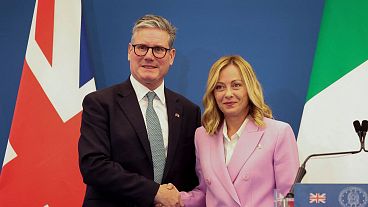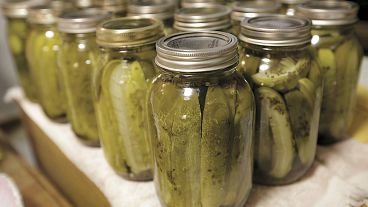A Norwegian proposal to ban unhealthy food advertisements doesn’t go as far as the UK’s rule but pushes far beyond other European countries’ efforts.
Norway is poised to enact one of the most comprehensive bans in Europe on junk food marketing that targets children and teenagers, following a related push by the United Kingdom and smaller bids elsewhere – but just how far it will go will be decided in the coming weeks.
The Nordic country’s food manufacturers and suppliers have voluntarily restricted such marketing to children under 13 since 2013, but the new plan would make it mandatory.
The rule would fully ban advertisements for junk food like candy, ice cream, and sodas, and rely on “nutrient thresholds” to identify the unhealthiest offerings in other food categories, such as yoghurt and cereals with high sugar content. And it would come with hefty fines for violations.
The plan would also raise the ban’s age threshold to 18, to the delight of consumer advocates and the consternation of Norway’s food and drink industry. The public has until late November to offer input on the rule, which the Norwegian government bills as a way to support children’s health and curb social inequities.
“Unhealthy food and drinks constitute a large portion of disease in the population generally,” Deputy Health Minister Usman Ahmad Mushtaq told Euronews Health.
“The intention is that [the ban] will reduce the pressure both on parents and the young people themselves to make unhealthy choices”.
Childhood obesity is associated with several health issues later in life, including heart disease, type 2 diabetes, chronic liver disease, joint conditions, and reduced fertility.
Between 15 and 21 per cent of Norwegian children are overweight or obese, compared with roughly 30 per cent across Europe and parts of central Asia.
Few countries have restricted kid-targeted junk food ads, so there isn’t much evidence yet that it actually curbs childhood obesity. But research does show that unhealthy food marketing affects their preferences, purchases, and eating habits, contributing to poor diets and weight-related issues.
‘Limits of self-regulation’
Industry self-regulation is the status quo across Europe. About two dozen companies have agreed not to advertise food that doesn’t meet nutrition standards to children under 13 in the European Union, in what they call the “EU pledge”.
But there are loopholes, according to a 2021 report from the European Consumer Organisation (BEUC) that suggests the nutrition criteria gives “a lot of leeway” for food and drink companies to market seemingly unhealthy products to young people.
“We are seeing the limits of self-regulation,” Emma Calvert, BEUC’s senior food policy officer, told Euronews Health.
The World Health Organization (WHO) first recommended in 2010 that countries limit advertising of food and non-alcoholic drinks that are high in fat, sugar, and/or salt as part of a suite of policies to promote healthier diets. In 2023, it advised stronger restrictions where countries would create “nutrient profile models” that identify the unhealthiest foods, and curb marketing of these products.
That’s the approach Norway is taking, though Mushtaq said its nutrient thresholds will likely be similar to the industry-defined categories used in its self-regulatory scheme.
The fee for violations could be up to 4 per cent of a company’s annual revenue, he said. It’s not yet clear how potential violations will be monitored and whether companies will get a grace period before being slapped with a fine.
“Every single case will be different,” Mushtaq said.
Norway’s proposal could change
The details of the ban will be hashed out in the coming weeks, and the country’s main business lobby, the Confederation of Norwegian Enterprise, will be pushing for amendments, according to Petter Haas Brubakk, who leads its food and drink branch.
Chief among their concerns is the age limit being raised to 18, Haas Brubakk told Euronews Health. He questioned how the health ministry would identify marketing directed toward 18-year-olds as opposed to 17-year-olds, for example.
They’re also worried about whether the rule would put Norwegian companies at a disadvantage relative to foreign competitors. When Norway raised taxes on chocolate and confectionery in 2018, it sent shoppers over the border to Sweden.
“Our main goal is that the regulation is as clear as possible,” Haas Brubakk said, especially regarding the product categories and the age threshold.
Supporters of advertising regulation also take issue with the 18-year-old age cutoff, but they want to see it expanded rather than scrapped.
Kathryn Backholer, a public health policy professor at Deakin University in Australia, pointed to the UK’s “age-agnostic” model, which will ban junk food ads during peak viewing hours on TV, rather than just restricting ads around children’s programming when it enters into force in 2025.
Another problem with the Norwegian plan, in Backholer’s view, is that food brands could continue to advertise using their company names or logos, as long as they don’t promote a specific item that’s considered unhealthy.
“No country around the world is really touching [this] because (…) there's no really good definition of how you define a brand as healthy and unhealthy,” Backholer told Euronews Health.
This isn’t the first time Norway has tried to ban unhealthy food advertising. Its previous effort in 2012 folded under pressure from the food and beverage industry, paving the way for the self-regulated system.
Mushtaq said that now, the political will is there to put government regulation in place. He expects it to be finalised soon after the comment period, and implemented by the end of 2025.
Online restrictions and other practices
The UK rules are seen as the toughest in Europe. In addition to the prime-time restrictions, it will fully ban online marketing for unhealthy foods, including through online gaming, which is popular among young people.
Such online restrictions are key for public health advocates because of the influence that social media creators have on kids, and because companies are able to send highly personalised advertisements to their intended audiences online.
Other European countries have taken steps in this direction, but they have not been as wide-ranging. For example, since 2019, Portugal has restricted unhealthy food advertising on TV or radio when at least a quarter of the audience is made up of children under age 16.
Officials in Spain and Germany have also called for child advertising bans in recent years.
In 2023, an EU working group recommended that member states adopt marketing restrictions across platforms, and that they raise the age threshold to 18, but EU lawmakers have not yet taken action.
“These kinds of best practices, it’s very important to have them,” Calvert said. “It’s a question of policymakers listening to the scientific evidence”.
Ultimately, Calvert said, advertising restrictions should be paired with other policies to promote healthy diets for children and teenagers. The UK, for example, also levies a tax on sodas and other sugar-sweetened beverages, which is credited with slashing children’s added sugar consumption by half.
Calvert is also in favour of mandatory nutrition labels on food packaging and limiting the promotion of unhealthy snacks at grocery stores and other retailers, such as having candy bars set up by checkout aisles.
“Any response to the obesity crisis needs to tackle all these influences,” Calvert said.















